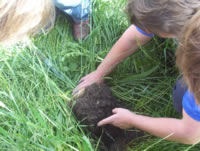
About Biodynamics
What is Biodynamic Agriculture?
Biodynamic agriculture is a modern, sustainable and ethical approach to food production based on scientific understandings of the physical and spiritual realities in nature.
Overview of Biodynamic Farming and Gardening
 Based on the spiritual insights of Rudolf Steiner, the biodynamic system encourages one to appreciate the earth as a coherent, living organism and be sensitive to and work with its cycles and needs. Biodynamic agriculture combines the best traditional farming methods with up-to-date management to create a modern system that makes ecological sense.
Based on the spiritual insights of Rudolf Steiner, the biodynamic system encourages one to appreciate the earth as a coherent, living organism and be sensitive to and work with its cycles and needs. Biodynamic agriculture combines the best traditional farming methods with up-to-date management to create a modern system that makes ecological sense.
The biodynamic practitioner uses a range of practices to revitalise the life forces in the soil, plants and animals. This results in food of the highest quality; full of life, vitality and of the highest nutritional value.
Biodynamic agriculture is vitally important to the future of mankind. It is related to every form of human endeavour; there is scarcely a realm of human life that is not in some way related to agricultural practice. Mankind’s social, economic, political and environmental spheres all relate to agriculture.
It is extremely important that farming and gardening practices are both sustainable and productive. The biodynamic approach is the most sustainable of all agricultural systems. It is based on the understanding of the interrelationships of living organisms and the processes which make up the ecological system, embracing forces working within the plants, the soil and the surrounding universe.
“Biodynamic farming has a balanced understanding of agriculture and thereby brings out the best of all traditional systems. Its subtle perspective makes a very creative environment for the farmer to function and transform agriculture from a skill to an art. This then brings with it the culture of nurturing and healing the soil, so as to heal the human body, mind and thereby the larger social system.”
Jai Chaitanya Das, Hare Krishna Nature Farm, Mysore
Biodynamic Farming and Gardening
“Biodynamics involves working with the forces of nature and the cosmos to provide food of the highest quality. A tenet of Biodynamics is that there is a connection between the quality of food and the ability to develop spiritually. The system is designed to support the welfare of people, animals and the planet in general and regards the earth as a living being. The soil is treated as a living organism and the biodynamic preparations and calendar are employed to enhance natural processes. The biodynamic system operates as far as possible in self contained units without inputs from elsewhere. This leads to a sustainable farm with a low carbon footprint and control over the integrity of all its materials and practices.
“Biodynamics has an important link with cattle as the ideal providers of the manure used in composting and fertilizing for horticulture and in the use of the cow horns for the BD500 preparation. There is an essential spiritual dimension in the work. Rudolf Steiner identified the “formative forces” at work in nature. The biodynamic practitioner is attempting to work in harmony with these types of energy.
“Open pollinated seeds are used and F1 hybrids and genetically modified crops are not allowed. A Biodynamic farmer works to develop the humus in soil so that crops are able to take what they require rather than being fed with fertilizer directly. Special preparations are applied to sites to enhance growing conditions. Rotation and green manuring are used and the influence of plants upon one another is also taken into account.
“Biodynamic produce attracts a premium which makes it attractive to farmers in the same way as Organic produce.”
Vicky Platt, Certificate Program course participant, December 2007
“This is a recipe of individual responsibility for environmental sustainability on the grandest scale. Such an approach to farming deserves support.”
David Wright, New Zealand Biodynamic Association

